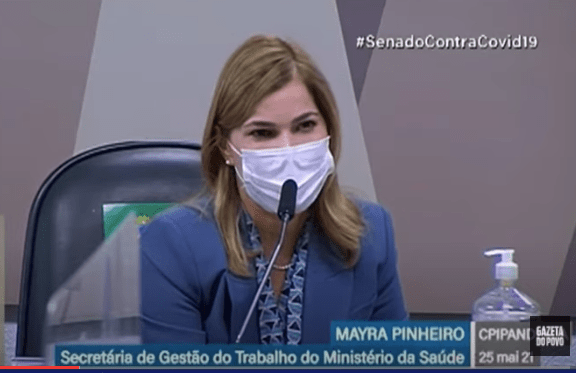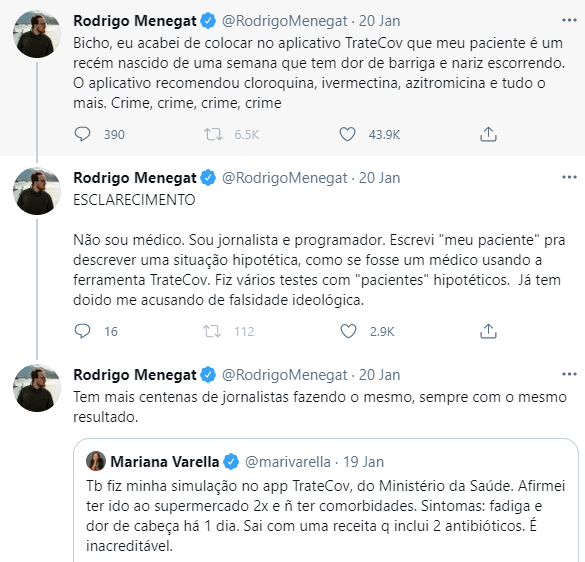
Government says journalist “extracted data improperly” — but the journalist affirms that he only used a browser’s Inspect Element tool, reports Beatriz Farrugia.
Data journalism has been at the centre of a political debate in Brazil for two weeks after President Jair Bolsonaro’s government made allegations against a data journalist — for extracting data from a web app developed by the Brazilian Ministry of Health to prescribe treatments against COVID-19.
The TrateCov app was launched in January 2021 for Brazilian doctors. Professionals were told they would be able to enter a patient’s profile and symptoms into the app, which would then suggest medication.
However, the data journalist Rodrigo Menegat analyzed the app’s source code and found that, regardless of the patient’s symptoms, age and health conditions, TrateCov indicated the use of chloroquine, hydroxychloroquine and ivermectin — drugs with no scientific evidence supporting their use in the treatment of coronavirus.
He announced his discovery on 20 January in a series of tweets. “Guys,” he wrote:
“I just put in the TrateCov app that my patient is a one week-old newborn who has a stomach ache and a runny nose. The app recommended chloroquine, ivermectin, azithromycin and everything else. Crime, crime, crime, crime.”

Other journalists and broadcasters tested the app and came to the same conclusion.
CNN Brazil reported that it simulated a query for a baby aged five months, with symptoms of fever and nasal congestion. The treatment recommended by TrateCov was chloroquine, hydroxychloroquine and ivermectin.
Soon after the complaints, the app was removed by the Brazilian Government.
Accused of committing cyber crime
Then on May 25th, during a public session of a parliamentary inquiry, Menegat was accused of having committed cyber crime by an official of the Brazilian Ministry of Health: Mayra Pinheiro.
The parliamentary inquiry, opened late last month, is investigating the Bolsonaro government’s response to the pandemic. More than 461,000 people have died in Brazil so far.
Approved by Brazil’s Supreme Court, the inquiry is pursuing multiple lines of investigation, such as why the Brazilian government promoted ineffective treatments and why three health ministers were removed over the pandemic.
Naming the data journalist, Pinheiro said Menegat performed an “improper data extraction”.
“He was unable to hack,” said Mayra. “He did an improper data extraction. Hacking is when you use someone’s password, enter a platform, a system. The term is not hacking. Today we have the official report that classifies it as improper data extraction.
“He did improper simulations. [The system] was taken down for investigation.”
In another testimony session to the parliamentary inquiry the previous week the former Health Minister General Eduardo Pazuello said that the app had been “stolen and hacked by a citizen”.
After the allegations the data journalist explained that he had only used the browser’s Inspect Element tool to analyse the source code.
“As a data journalist and developer, I only analyzed the source code which was public and available on the website of the TrateCov app, saved on a government server (https://tratecov.saude.gov.br) and accessible to any internet user curious enough to do this verification on their own.”
“The procedure has in no way altered any content on the platform”, he added.
Since the allegations Menegat has limited his social media accounts to avoid online attacks by government supporters.
“I am closing my Twitter account for more than an obvious reason, but I will be very pleased to show who wants to know how to use the Element Inspector to access source code from any website in the world,” wrote the journalist.

Other Brazilian data journalists showed support for Menegat and published content explaining the technique used to analyse the app.
“The alleged hacking of the TrateCov application was nothing more than a journalistic investigation technique already used in newsrooms around the world,” said Daniel Trielli, journalist and researcher in media, technology and society, in an article published by the Folha de S.Paulo newspaper.
